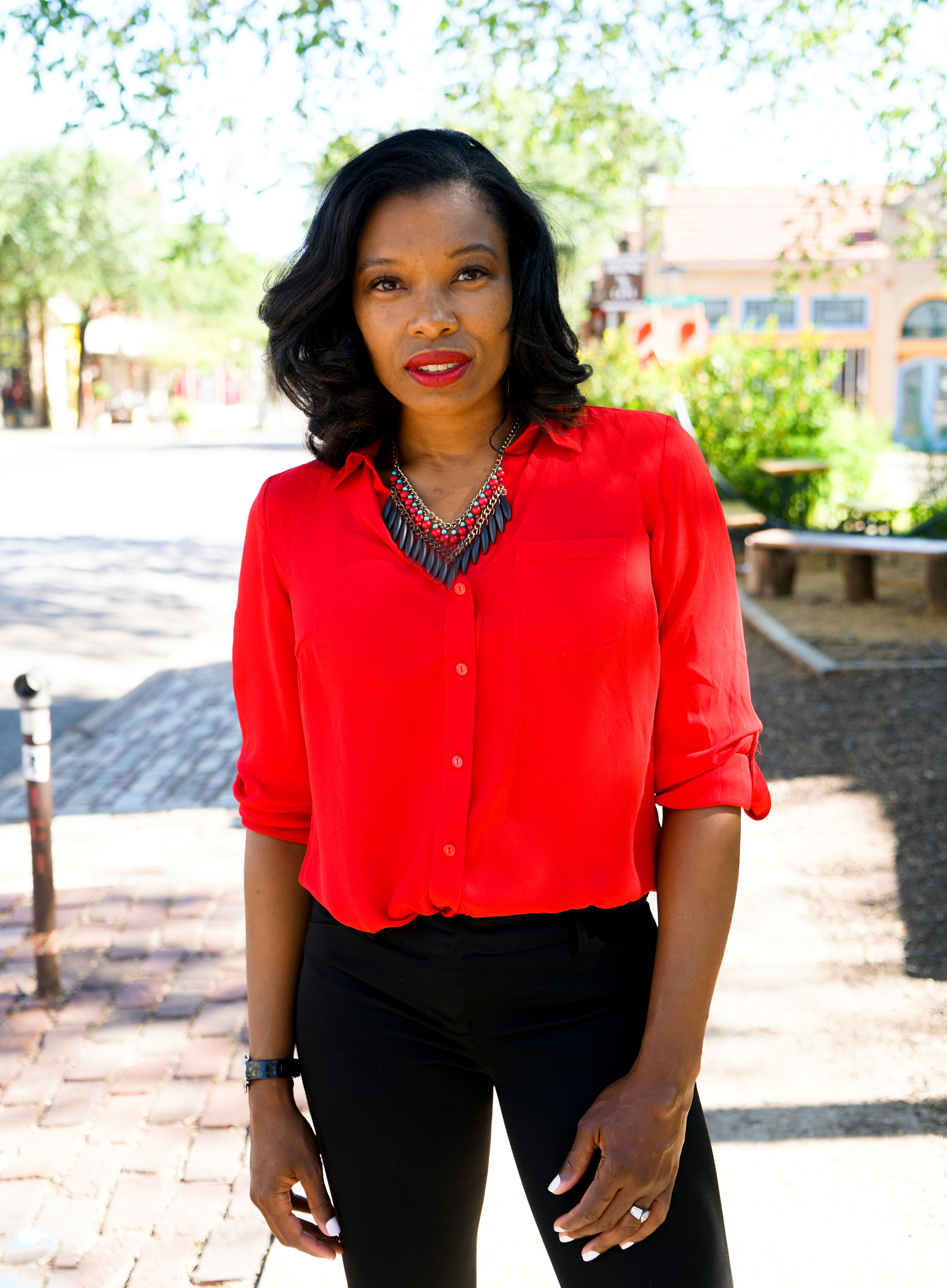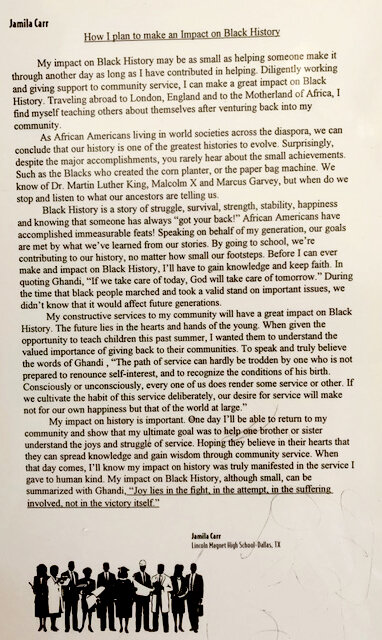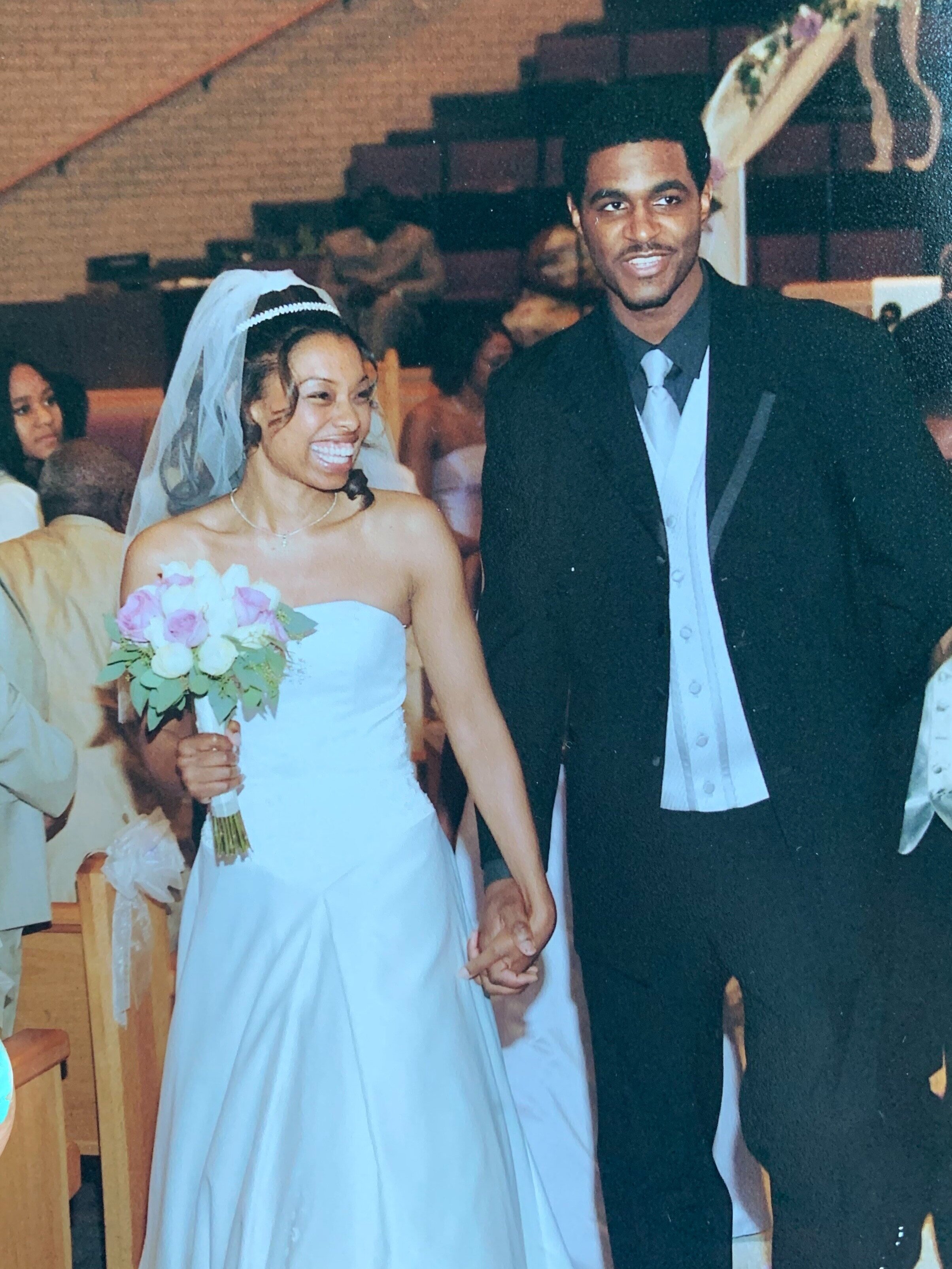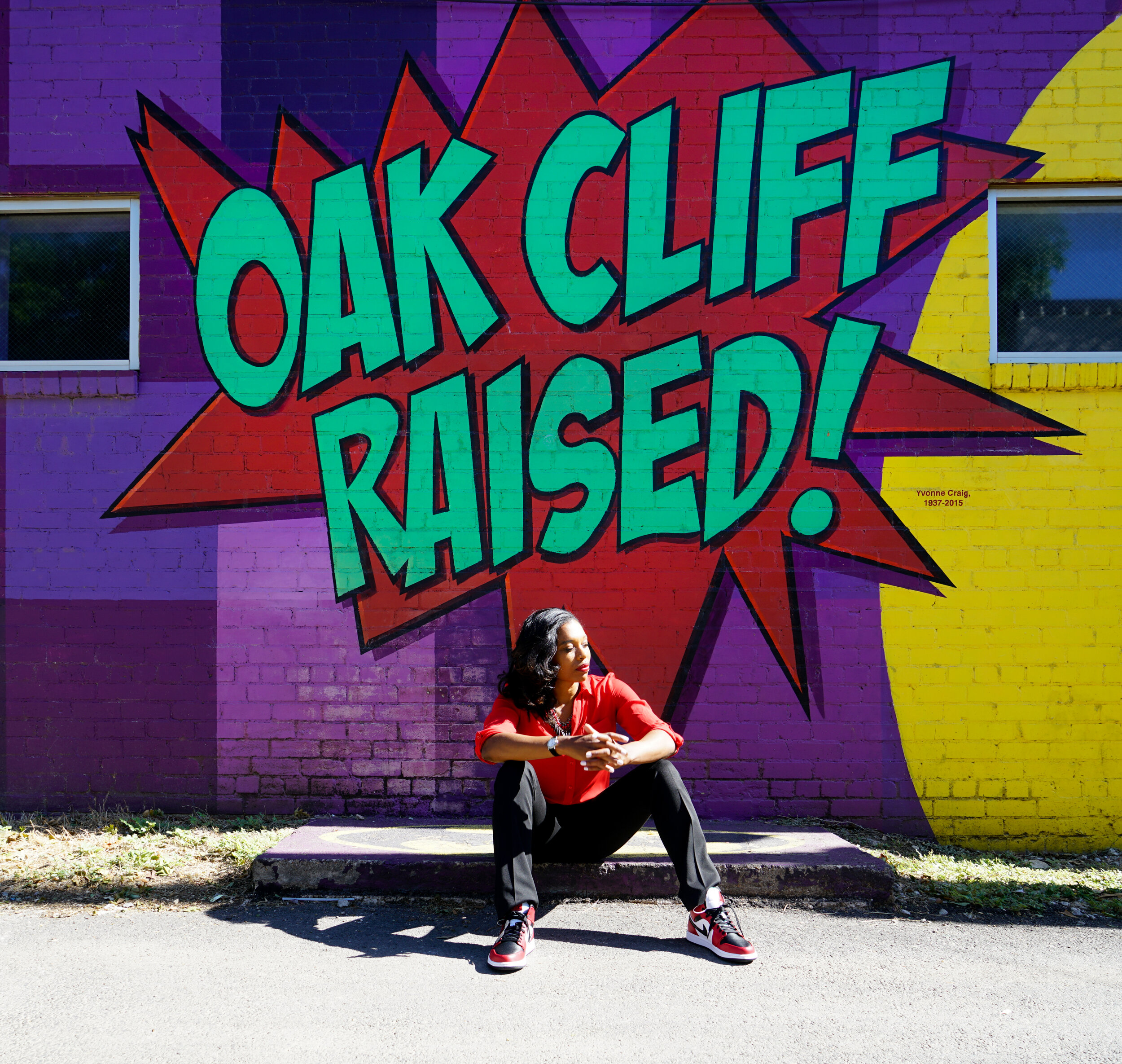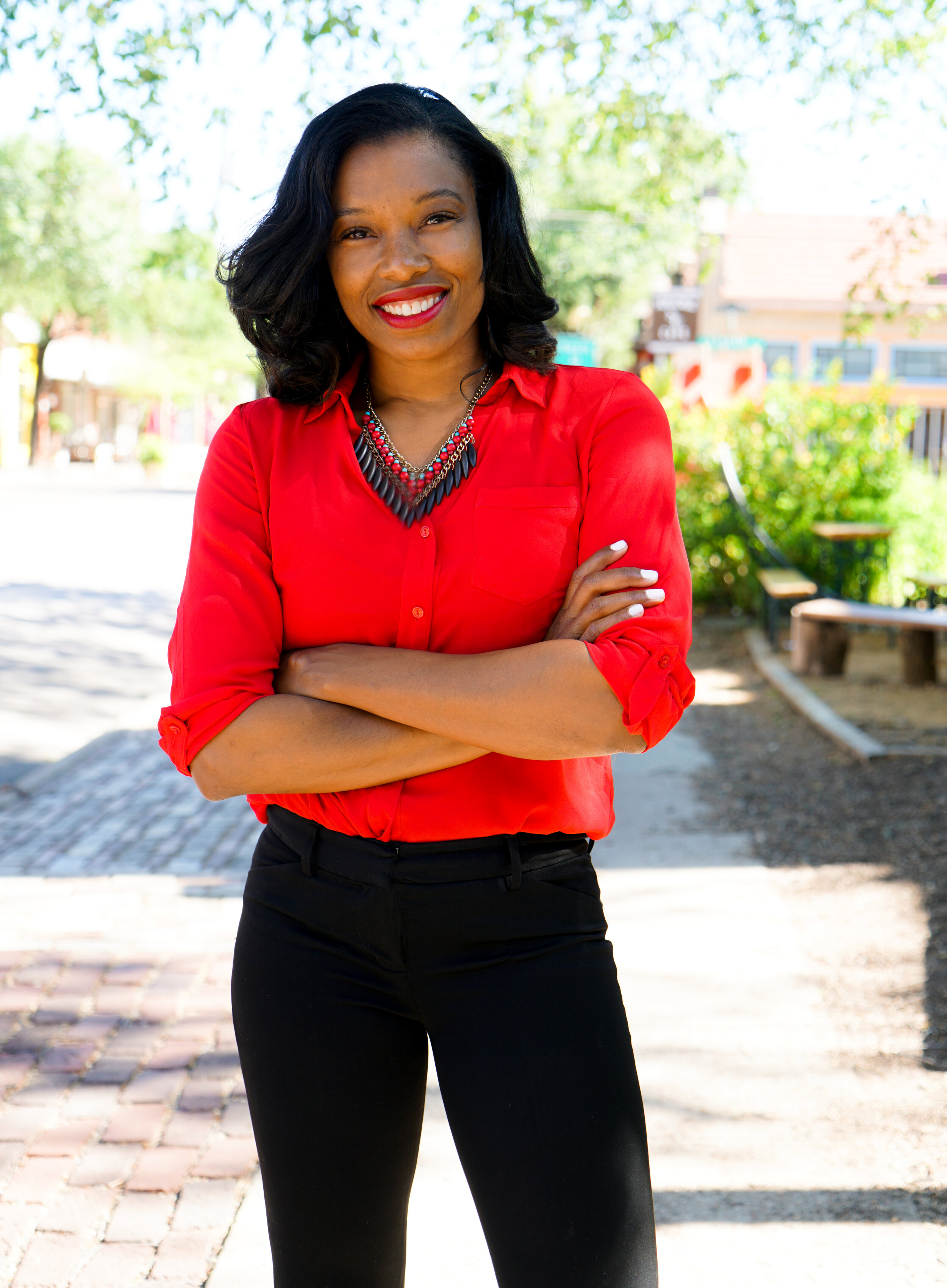Published June 15, 2020 at 5:31pm
Story by Mary Martin. Photos by Kirsten Chilstrom.
In March of 1995, Jamila Carr arrived in West Africa with her mom and sister. Her father had died suddenly just two months earlier, on Martin Luther King Jr. weekend, and the family’s grief was fresh. An educational tour with Lincoln High School brought the Carr women face-to-face with the castles where Africans were loaded onto ships for the transatlantic slave trade and, even in the moment, Jamila knew that her experience there would be life-shifting. “We experienced all of these beautiful and wonderful things, coupled with death,” Jamila remembers. “And it taught me that everything is dying to come back to life, especially after seeing the ‘Door of No Return.’ Even now, with systems being exposed and broken down, there is beauty of the death of systemic racism.” Jamila returned to Dallas with a renewed sense of purpose, making sure that her contribution to the world would make a significant impact for people, a purpose that still guides her to this day.
Jamila has always been focused. A natural leader and activator, she served as class president three out of four years in high school, while also participating in track and field, cheerleading, and Junior Olympic-level volleyball. During Jamila’s senior year, she was chosen as a student delegate by the office of Congresswoman Eddie Bernice Johnson to participate in the Mother’s Against Drunk Driving (MADD) National Teen Youth Summit. As a MADD student delegate she traveled to Washington D.C. to help lobby Congress regarding public service announcements around drunk driving. It was there, on the steps of the capitol, where Jamila gained her public speaking confidence, along with the realization that change is possible.
An essay that Jamila wrote at the age of 16 about black history and her community impact.
As Jamila considered her college choices, she was influenced not only by her trip to West Africa, but also by her high school humanities teacher, Dr. Juanita Simmons. “Dr. Simmons was all about making sure that we understood who we are, as African American children, who we are as people that contribute to the world, and who we are as it relates to our ancestry community,” says Jamila. In light of those experiences, she was determined to attend one of the Historical Black Colleges and Universities (HBCUs). Jamila chose Florida A&M, where she earned her bachelor’s degree in Business Administration, along with an MBA. Her penchant for going above and beyond the requirement led her to take on five internships, rather than the assigned three.
Just before graduating in December 2002, Jamila’s high school sweetheart, Brandon Thomas, proposed and Jamila was offered a sales job at Cigna in downtown Chicago. “We were just old school. We didn’t want to live together before we got married,” remembers Jamila. “I accepted the job offer the same day that I graduated, and that next Monday they wanted me in Philadelphia for training. I was there for four days and when I got back that Thursday, we packed up a u-haul. Nothing was in it, well, because all we had were clothes and a little stereo system. And so we were like, wait, let’s go get our marriage license!” The couple drove to the nearest courthouse expecting to be married on the spot, only to find out there was a three-day waiting period. But a kind judge waived the waiting period and signed their license. Covered in dust from loading the moving truck, and wearing sweats and tennis shoes, Jamila and Brandon drove to their local church, where their pastor put on his robe and married them right away. “After that, we literally jumped in our u-haul and started our trip to Chicago. By the time we got to Texarkana, I freaked out. But we were together. We were madly in love and it was all that mattered. It was just us,” Jamila shares. “And then when we finally made it to St. Louis that night, we were so tired and exhausted, it wasn’t much of a honeymoon!”
Jamila and Brandon made it. They made it not only to Chicago, but eventually all the way back to Texas where Jamila is now Senior Vice President for Corporate and Community Engagement at Big Brothers Big Sisters Lone Star here in Dallas, and Brandon serves as the boys basketball Head Coach and Athletic Director for Faith Family Academy. Eighteen years of marriage has brought them a son and daughter, and the challenges that come when you dedicate your life to creating positive change.
Jamila presenting her speech on the steps of the nation’s capitol during the MADD National Youth Summit in 1997.
Jamila and Brandon at their second anniversary vow renewal ceremony.
Back in Chicago at the start of 2003, Jamila took on the sales role at Cigna, building relationships with health providers in the downtown core. And as she was pursuing further leadership training, she was recruited to become an Insurance Director at EIIA, an insurance firm that was originally created from the United Methodist Church as a way to properly insure HBCU institutions that other insurance firms refused to cover in the Jim Crow era. Even with its deep historic roots in the black community, Jamila was the first black woman to serve as director and faced an uphill battle, especially after returning from maternity leave. After eight years, she ultimately made the difficult decision to leave her career at EIIA while she focused on a Masters of Divinity program at the University of Chicago, a calling that lined up with her passion for helping young people. “I had been volunteering through the YWCA, focused on causes supporting the growth and development of young women YMCA, but at the same time I had this pull to work with young women who had been incarcerated. She believed that juvenile detention centers were sacred ground with seeds full of potential.” When Jamila began working with the young women in the Cook County Detention Center, she began learning what it really means to serve without centering yourself in the work. “When you would walk in the detention center, you’d have to strip your entire identity. Glasses down. Hair up. And the girls asked questions about everything. We made question asking anonymous so they would literally ask about everything from sex to Jesus,” Jamila shares. “And one day I opened a question that just said ‘Is God here?’ and I said ‘You know what? You just invited God here by asking.’”
This led her to begin thinking about girls who were not incarcerated, girls from all socio-economic backgrounds. She believed that all women need sacred and safe spaces to share their fears, dreams, hopes and aspirations. “Sometimes all we all need is a listening ear to propel and inspire us towards our new destination.” She pulled some girlfriends together and they developed something specific to the needs of young women and started a nonprofit called Women Divine,” Jamila says. “It is all about educating, inspiring, and empowering young women to live into their fullest potential in every aspect.”
That experience was foundational to her Masters of Divinity studies, focusing her research and writing on the 21st Century Burgeoning Womanist Theologian: The Significance of Testimony in the Academy. “That was why I focused on what means to be a womanist theologian, that is to place black women’s experiences within the context of a biblical worldview, and how we work to galvanize it and bring all people together,” Jamila shares. After earning her Master of Arts in Divinity, Jamila and Brandon made their way back to Dallas where Jamila began serving as the Outreach Pastor at St. Luke’s United Methodist Church in Dallas’ Owenwood neighborhood, just northeast of Fair Park. It was there that Jamila earned recognition for her dedication to the community and strategic ideas for practical change. During the fall of 2015, the leadership at Dallas ISD took notice, and invited Jamila to join their team as the African-American Success Initiative Coordinator. “After two years in that role, Deputy Superintendent Ivan Duran asked me about my thoughts on racial equity, because the district had tried to pass a racial equity policy a number of years ago,” says Jamila. “It had failed at the board level, not because they didn’t have good intentions, but I don’t think they were ready to have conversations that would move the work forward in a conscientious way, and to ensure that all students were impacted.” From that moment, Jamila committed herself to the work of racial equity throughout the school system, not only at a systematic level through policies and programs, but also in a systemic way that would reach the community.
Overarching and overdue change across an entire school district does not happen overnight. For the next two years, Jamila researched how other school districts have addressed racial equity, met with leaders from across the education sector, and searched for pockets of excellence and best practices. In 2017, after ongoing conversations with the Board of Trustees and district leadership, to capture their voices, Jamila presented the Racial, Socio-Economic and Educational Equity resolution to the Dallas ISD school board, and the resolution passed unanimously. “But I was still that 16-year-old girl with Africa on my mind. And I knew we had to talk about history,” says Jamila. “And I talked to Dr. Robert Edison, who had been a director of social studies for more than 20 years and told him that I wanted develop an African American Studies course. So he coached me along the way and showed me what I should do.” Setting out to create a high school level elective course in African American history would take someone just like Jamila, with the determination, life experience, education, and passion for ensuring that all Dallas students can access to this crucial knowledge.
As Jamila was working on furthering the policy and writing the history curriculum, she was also thinking through the educator training that would have to accompany the new course. “I knew that we had to talk about implicit bias, and cultural intelligence, and cultural competency, because that is what will set the tone for culturally responsive teaching and learning,” Jamila shares. “You can’t simply give a teacher a book and say, ‘go ahead, go be culturally responsive and teach and learn.’ First, you have to know who you are—your identity—not just as a black person or a white person, but your soul dynamic and your culture, which is coupled with race.” So as Jamila listened and spoke with various members of the Dallas ISD Trustees and leadership team, they reached a conclusion that it was time to establish a Racial Equity Office, and Jamila would take the lead on its implementation and development.
Just after Jamila began building out the framework for the African American studies course, she met with Aicha Davis, who was running for a seat on the Texas State Board of Education. She and Jamila had both recently visited the new African American Museum in Washington D.C. and were thinking about ways to bring that kind of education to Texas. “Aicha asked me if I had considered creating an African American Studies course and I told her that I was currently working on it,” shares Jamila. “Aicha said, ‘You know what, Jamila? You and I are going to work together.’” After that, the course development gained momentum through public-private partnerships and access to some of the leading scholars from around the country.
Getting the African American Studies course implemented at the state level was always the goal, but first Jamila had to present it to Dallas ISD, which would then take it to the Texas State Board of Education. In January of 2019, Dallas ISD unanimously passed the resolution to adopt the new high school course, and Jamila started the process to submit information and documentation that would line up with the Texas Essential Knowledge and Skills (TEKS). Her team began testifying before the State board in the fall of 2019, continued into January and February of this year, and in April of 2020, the African American Studies course was approved for all Texas high schools.
But after passing the African American Studies course at the Dallas ISD level, Jamila began to realize that her work was nearly complete. At the beginning of 2019, Jamila had been named a Presidential Leadership Scholar, and through that process she recognized that it was time to take her next step. In September of 2019, she accepted her current role at Big Brothers Big Sisters, following her heart for mentoring young people. “I felt that now I could delve into the work that feeds my soul. The work that I felt even as a 16-year-old girl who wanted to bring people together,” says Jamila. At Big Brothers Big Sisters Lone Star, Jamila is focused on the value and impact of children, and how adults can walk alongside them in the next step of their lives.
Though her position is focused on community engagement and partnership building, in the past month Big Brothers Big Sisters has leaned on Jamila’s experience in creating equitable experiences and culturally responsive policies in a heightened time of racial and social justice awareness. “There are times these conversations get emotional because I don’t think I should have to tell people how to work with me, or people who look like me. I don’t think I should have to teach people how to engage with the world at large. It should be part of the humanity that we live out. But this morning my team told me that they got it,” shares Jamila. “They understood that I shouldn’t have to be leading this work, but now we’re leading it together. Nobody’s an expert in diversity, equity, or inclusion. We all should be walking in a space where we understand the value, and the necessity of talking about historical implications of race, but also value what we each bring to the table.”
Jamila is also highly aware of the implicit bias training that will need to happen at the mentor level for Big Brothers Big Sisters, helping to create healthy relationships across cultural barriers. “We are discussing why it is important to talk about Black Lives Matter and social justice and systemic racism, and how to use the right words in the right way so we don’t do more harm than good,” says Jamila. “This is part of the world we live in, and even for volunteers, we need to guide and lead them along the way.” And though Jamila didn’t expect to continue her racial equity work at Big Brothers Big Sisters, she can see how her experiences have prepared her for this moment in time. “When I think about that girl who went to Africa who had just lost her dad and was navigating a world that may not see her for who she truly is, I lead with that,” she says. “I know that all of us have something to contribute, and that my vision may not even be for me, but maybe for your children and the children coming after them.”
Big Brothers Big Sisters has also taken the move to all-virtual programming in stride, implementing Facetime Fridays and e-mentoring, all with safety and security in mind. All volunteers participate in a two-hour personal interview and work directly with social workers and match support specialists to make sure that the connection between Bigs and Littles is healthy.
And as Jamila looks toward the future of mentoring and education in our community, she is hopeful, with an eye toward the practical steps that need to be taken for true equity to exist. ““I dream about the day when we will no longer need racial equity offices or diversity inclusive focuses, because racial, socio-economic and educational equitable practices will have become systematic in our programs and systemic into the community,” says Jamila. “Where we can speak the truth and speak truth to power with conscientious conversations about any disparities we may see. If I’m in a position where I’m losing and I’m on the team, guess what, we’re all losing. That’s what I hope to see; that with this idea of becoming inclusive and embracing the beauty of diversity, we no longer have to say that we’re doing it, we are just doing it.”
If you would like to get involved as a Big at Big Brothers Big Sisters Lone Star, you can sign up to volunteer on their website. You can also make a donation to help fund more connections.
